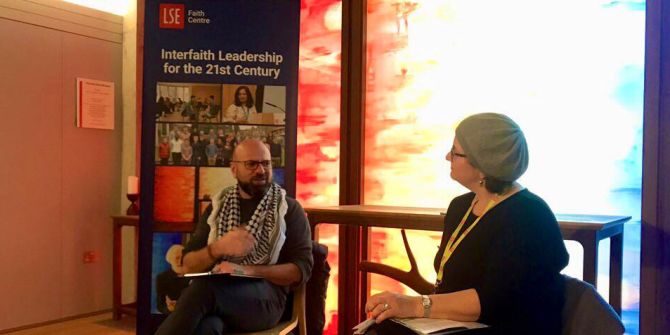An international panel of social scientists has produced a ground-breaking interdisciplinary report on the need to better understand how social progress can be pursued. As lead authors of the report’s religion chapter, Grace Davie and Nancy Ammerman outline why many assumptions about religion are unhelpful and counter-productive. Instead, the specific cultural situations must be carefully analysed.

Does religion contribute to or inhibit social progress? This article offers a social scientific response based on our work for the International Panel on Social Progress (IPSP).
The IPSP came into existence to assess and synthesize the state-of-the-art knowledge that bears on social progress across a wide range of economic, political and cultural questions. The goal was to provide the target audience (individuals, movements, organizations, politicians, decision-makers and practitioners) with the best expertise that social science can offer. The final three-volume report was published by Cambridge University Press.
Setting aside Enlightenment assumptions that progress is somehow built into history, the IPSP (a consortium of some 200 scholars) sought innovative ways to understand this better. The notion of a compass was deployed as a metaphor in the sense that it sets the line of travel, recognizing that the map in question is complex and the destination elusive. What is considered progress in one situation may be differently assessed in another.
Early in 2015, we were invited to become Co-ordinating Lead Authors (CLAs) for the chapter on religion in the report. Chapter 16 can be downloaded here.
Defining the task and defining religion
The first meeting of the IPSP authors (including ourselves) took place in Istanbul in August 2015. It was a learning experience in every sense of the term. Not only was this the first time that the chapter team had come together, it was also the moment when we appreciated that significant sections of the social-scientific community were hesitant about the relationship between religion and social progress as we were learning to understand this. This hesitancy took two forms: either religion was irrelevant (i.e. no longer of significance), or it was negatively perceived – in other words inimical to social progress. The fact that religion was (or more accurately was deemed to be) ‘back’ was therefore a problem.
In the 48 hours that we spent together, we worked hard on finding ways to counter these at best partial, and at worst inaccurate, views starting with a clear definition of religion itself. Escaping the limitations of a purely Western perspective was the first step. We argue that religion is more – much more – than the broad range of institutions and beliefs traditionally recognized by social science; it is rather a very much larger cultural domain that encompasses the beliefs and practice of the vast majority (over 80%) of the world’s population.
Religion is a lived, situated and constantly changing reality, and has as much to do with navigating everyday life as it does with the supernatural. It follows that secularity should be considered an equally fluid entity, whose distinction from religion will vary from place to place – a division decided more by the context in question that by a pre-determined essence. That said, we recognize that what we term humanity’s ‘limiting conditions’ – death, suffering, injustice – are likely to be confronted and explained in religious terms across a wide range of societies.
From this starting point we developed our approach to the relationship between religion and social progress. Our task was to scour the available literature in order to document our case, but we began from the belief that neither good nor ill could be assumed from the outset. We had rather to look case-by-case in different social and cultural domains, and in different parts of the world, to see what was happening on the ground. We were well aware that particular forms of religion were perceived negatively, sometimes rightly so. Without doubt religion can take forms that are destructive of people and places. Elsewhere, however, religious individuals and religious communities are manifestly associated with the health and wellbeing of their respective societies – an entirely positive feature.
Expanding the field
In order to get a grip on this agenda, we worked ‘upwards’ from the micro to the macro. Specifically, we began with the most intimate of human relationships (i.e. those that relate to gender, sexuality and the family), appreciating that these have been moulded from time immemorial by religious rules, rituals, and prohibitions—some of which have advanced human flourishing, but many of which have not.
The subsequent sections deal with political issues. The first addresses the question of diversity – looking (a) at its shape and forms in the late modern world and (b) at its governance. The second confronts directly the much talked-of connections between religion and conflict.
Here the core argument is easily stated. To ask whether religion – or certain forms of religion – cause conflict or violence is not the most helpful approach. Much more constructive are enquiries that look systematically at the circumstances in which a violent outcome is likely. Contestation over physical spaces is one such, as is an excess of regulation which leads all too often to negative consequences for religious minorities. Even more important is the considerable evidence that weak or failed states (and the fragile economies associated with them) encourage – by default – violent and authoritarian attempts to restore order, irrespective of any religious factors that may be present.
There are two further substantive sections. The first deals with the place of religion in the wellbeing of individuals and communities. A striking example can be used to illustrate the approach. Faced with the seeming impasse between secular health professionals and faith-based initiatives in parts of the developing world, a series of contributions in The Lancet offers an evidenced-based way forward – one that favours partnership whenever possible. The second examines the role of faith-based organizations in caring for the earth itself (the most ‘macro’ in our scale of analysis). Again, a single example captures the potential. Laudato Si’ – the second encyclical of Pope Francis – was published in 2015; it has become a defining moment in the debate about climate change.
An action toolkit
The concluding paragraphs of our chapter took the form of an action toolkit, which found its rationale in a set of cross-cutting themes. These include the persistence of religion in the modern world; the importance of context in discerning outcomes (both positive and negative); the urgent need to enhance cultural competence (not least religious literacy) in different parts of the world; the significance of religion in initiating change; and the gains that accrue from effective collaboration.
The detail cannot be pursued here, but the following stand out. First is the continuing need for assessment and – where necessary – constructive criticism of the role religious ideas and actors might play, bearing in mind that social progress not only evolves but looks different in different places. Second are the demonstrable benefits of well-judged partnerships, noting that ‘well-judged’ is the crucial word in this sentence. As we state in the report:
… researchers and policy-makers pursuing social progress will benefit from careful attention to the power of religious ideas to motivate, of religious practices to shape ways of life, of religious communities to mobilize and extend the reach of social changes, and of religious leaders and symbols to legitimate calls to action.
About the authors
Grace Davie is Professor Emeritus in Sociology at the University of Exeter, UK. She is the author of Religion in Britain: A Persistent Paradox and Religion in Public Life: Levelling the Ground.
Nancy Ammerman is Professor of Sociology of Religion at Boston University. She is the author of Sacred Stories, Spiritual Tribes: Finding Religion in Everyday Life and Pillars of Faith: American Congregations and Their Partners.
Note: This piece gives the views of the author, and not the position of the LSE Religion and Global Society blog, nor of the London School of Economics.






1 Comments